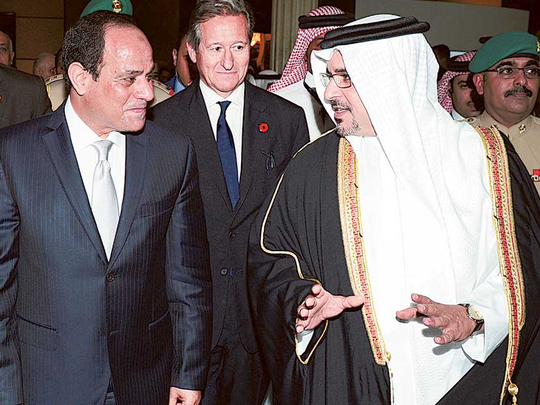
Manama: Bahrain’s Crown Prince Salman Bin Hamad Al Khalifa has warned that “the urgency with which solutions must be found to address the human suffering within the region has never been greater.”
Speaking at the opening of the 11th Manama Dialogue, an international high-level security conference held annually in the Bahraini capital, Prince Salman said: “All countries must recognise that long-term stability is built on the foundations of hope, opportunity and prosperity, and that the principles of tolerance and coexistence must inform every aspect of regional reform.
“It is exactly these principles that are being opposed by the violent extremists in the region who distort religion in order to disrupt development.”
In his remarks about the situation in Syria, the Crown Prince said that the international community must accept the difficult truth that it has collectively failed the millions of innocent people so badly affected by the civil war. The Syrian people now constitute a fifth of the 60 million people in the world displaced as a result of crises, and international efforts to achieve a long-term political solution — which has eluded the international community for over four years — must be agreed without delay, he added in remarks carried by Bahrain News Agency (BNA).
Referring to the situation in Yemen, Prince Salman said that the efforts led by the Gulf Cooperation Council (GCC) in the southern Arabian Peninsula country “demonstrate the way in which diplomatic efforts can be aligned with military collaboration in order to decisively address conflict”.
The Crown Prince stressed that this year’s Manama Dialogue takes place at a crucial juncture as a number of critical issues are challenging security across the region and the world, and conveyed hope that the serious and productive discussions that take place at the event would “make a significant contribution to solutions that foster lasting regional stability”.
In partnership with the International Institute for Strategic Studies (IISS), Bahrain has led the region’s foremost security conference for over ten years and the conference continues to provide a unique forum that facilitates multilateral engagement and private diplomacy in resolving conflict, he said.
Prince Salman welcomed Egyptian President Abdul Fattah Al Sissi’s comments regarding the need for social and economic development to underpin stability and long-term positive change.
The Egyptian leader delivered the opening address in which he detailed the complexity of issues currently facing the region.
In his opening remarks, John Chipman, the Director-General and Chief Executive of IISS, said the Manama Dialogue “is a strong anchor to all of our work here”.
“Each year, with this regional security summit, we take the temperature, measure the pulse and analyse the direction of change in the Middle East,” he said. “In the past year, we have seen leaders in the region take a stronger stand to design their political and security environment, rather than be shaped by it. The accelerating pace of events is driving states to adjust foreign and defence policies at speed. Outsiders are recasting their approach to Gulf security, or reaffirming their interests afresh. Those within the region are adjusting their public position, creating new alliances and inventing new policies. External military and political intervention has in the past been regretted. Its absence is no less often a cause for disenchantment. The intermingling of religious and territorial competition is, for some of us here, historically reminiscent of Europe’s Thirty Years’ War.”
Chipman added that “while in the last 30 years there has been a significant shift in political power and influence to the states of the Gulf, Egypt remains the indispensable Arab state.”
“It has an enduring political and demographic weight and a political history that encapsulates all the issues that we will discuss at this summit: the making of war and peace, revolution and nationalism, the challenges of economic modernisation, religiously based extremism and insurgency,” he said. “Egypt is a central political fact. It is essential to any settlement of the conflicts that currently wrack the region — from Yemen, to Libya, to Syria and Iraq.”












